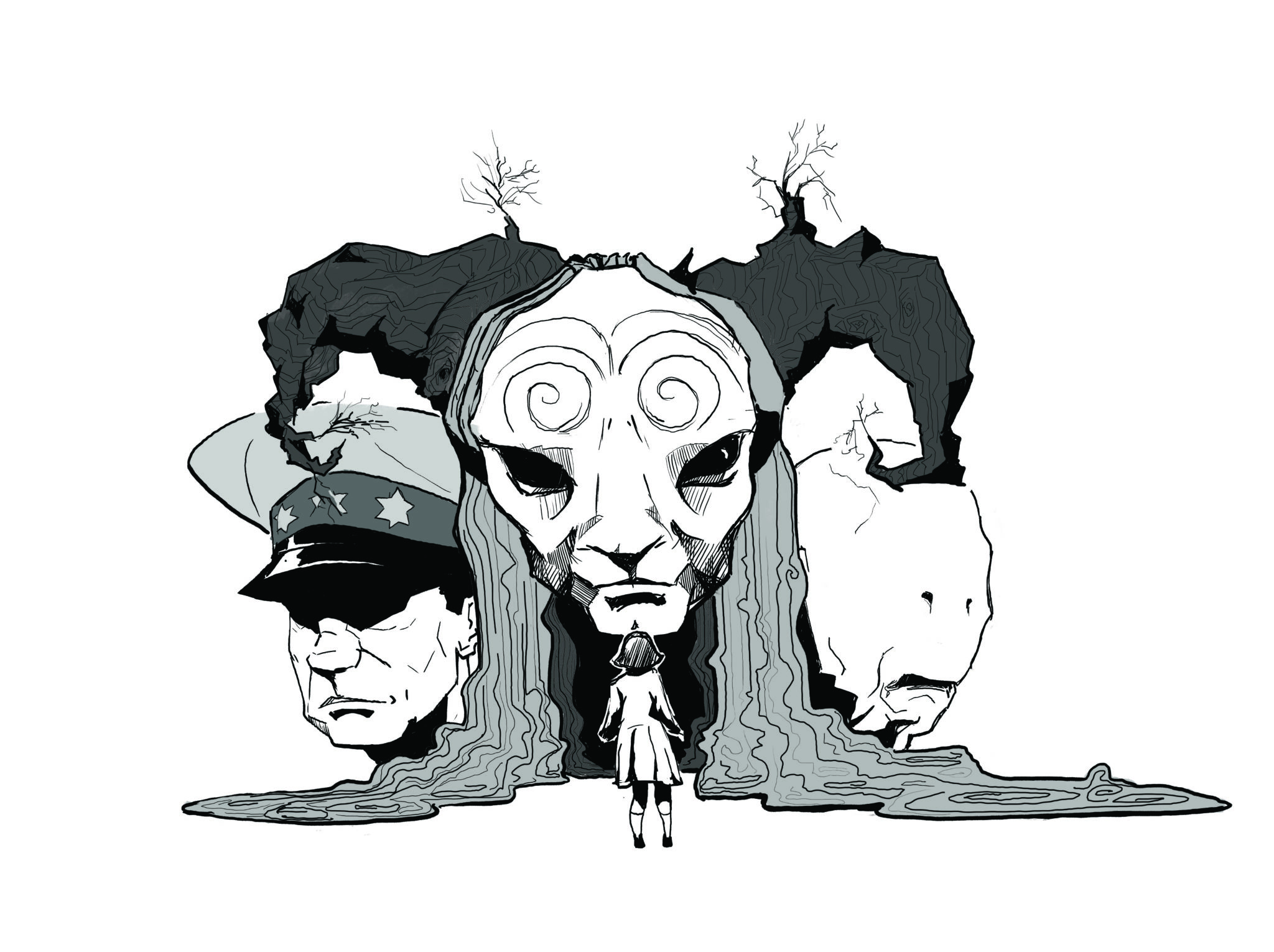
“Has elegido bien.”
These are the Faun’s last words to Ofelia, the ten-year-old protagonist of the Spanish-Mexican fantasy film, “Pan’s Labyrinth.” For all its commentary on the subversive force of fascism, it is fundamentally a story about choices.
The film opens to Ofelia lying bloodied at the edge of a chasm. As the camera pans to the time-weathered masonry of a dim world below, the Faun, a mythical creature that takes the shape of both a goat and a man, explains that Ofelia is Moanna, the daughter of the king of the underworld. Having ventured into the mortal world, she became stranded in a human, corporal form. Returning to Ofelia, the blood returns to her body and the screen opens to her and her mother Carmen riding through the countryside. Carmen stops the entourage to rest, foreshadowing the rapid decline in health she experiences throughout the film. Ofelia wanders into the forest and is drawn to a stylized stone faun.
Ofelia and Carmen are welcomed to the military compound by Capitan Vidal, a Falangist general posted in rural Spain to root out anti-Franco rebels and father to Ofelia’s unborn brother. Vidal greets Ofelia with a harsh look, to which Ofelia outstretches her right hand. Vidal seizes her hand and insists to have the other — she refuses.
In a fairy tale full of fauns, mandrakes and other magical creatures, Vidal develops to be the monster of the story. When a father and son are apprehended carrying guns they claim to be intended for hunting, Vidal brutally dispatches the men, using a bottle of whiskey to bash in the son’s face before shooting his father. When Vidal digs through their bag to find rabbits, and not rebel paraphernalia, it’s sinister joy and not regret that marks his face.
That night, Ofelia is met by a fairy who leads her to a labyrinth deep in the woods, where she encounters the Faun, who explains that hers is the soul of princess Moanna. To ensure that she can return to the underworld — that her soul has not turned mortal — Ofelia will have to complete three tasks.
As Ofelia enters the realm of the unreal to complete the tasks — killing a giant toad, retrieving a sacrificial knife from the lair of the Pale Man — her mother becomes increasingly frail and Vidal increasingly cruel. When Vidal discovers that Ferreiro, a doctor in his service, had assisted a rebel whom Vidal had brutally tortured to commit suicide, he demands to know why the man would disobey his orders.
“Obedecer por obedecer, así sin pensarlo, eso sólo lo hacen gentes como usted, capitán,” Ferreiro tells Vidal.
After she burns the mandrake Ofelia kept under her bed to keep her alive, Ofelia’s mother expires in childbirth. Vidal, who had seen Ofelia’s mother as a vessel to bring him a son, takes him greedily from the doctor, overjoyed in his son’s mother’s dying hours.
Parentless, Ofelia senses the danger awaiting her. The night of a rebel attack, the Faun returns to her, promising her that she will return to her parents in the underworld as long as she fulfills a third and final task — to bring her infant brother to the center of the labyrinth, at the edge of the chasm.
Ofelia drugs a wounded Vidal with an opiate, and rushes out of his chamber carrying her brother. Vidal chases her to the labyrinth, where the walls swallow Ofelia into its center and keep Vidal at bay.
She reaches the chasm and sees the Faun wielding the knife she had retrieved from the Pale Man’s lair. The Faun explains to her that they must act quickly to open up in the chasm a portal to the underworld while the moon is full. All it will take is a drop of the blood of an innocent, the Faun tells her. But Ofelia refuses, saying that her brother stays with her.
The Faun ignites into anger, asking, “Negareis vuestra cuna por el — el, por quien habeis sido humillada, ignorada?” After she confirms, “Si, la niego,” he departs, saying, “Hagase pues vuestra voluntad.”
Vidal turns the corner, ripping his son out of Ofelia’s hands and fatally shooting her on the spot.
As she lay by the chasm, her hand hanging over it, the blood trickling from her fingers falls into the hole, and a warm light overtakes her. She awakes in a palatial courtroom, a king and queen elevated on seats towering above her. The king, her father, explains that this choice — shedding one’s own blood in place of the blood of an innocent — was the final, most important task. A now placid Faun enters, assuring Ofelia that she had chosen well. The crowd cheers to a smiling Ofelia, and the Ofelia lying by the chasm passes on with a calm face.
Torn between the terrifying fantastic and a horrifying fascist reality, Ofelia transcends the demands of her worlds through choice — unlike the classical fairy tale, Pan’s Labyrinth asserts the power of the powerless and the emancipatory power of principled choice.
Josh Purtell | josh.purtell@yale.edu .







